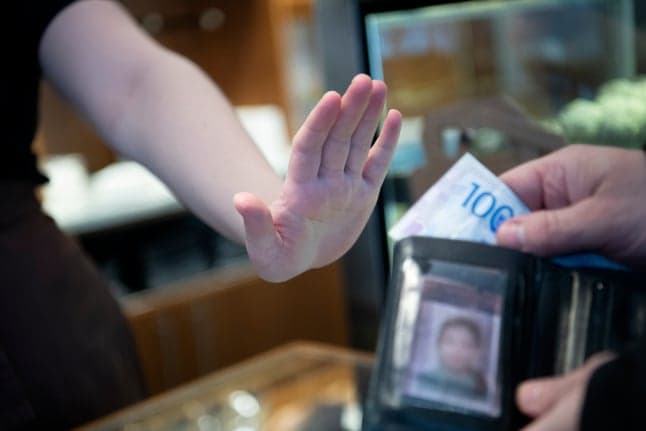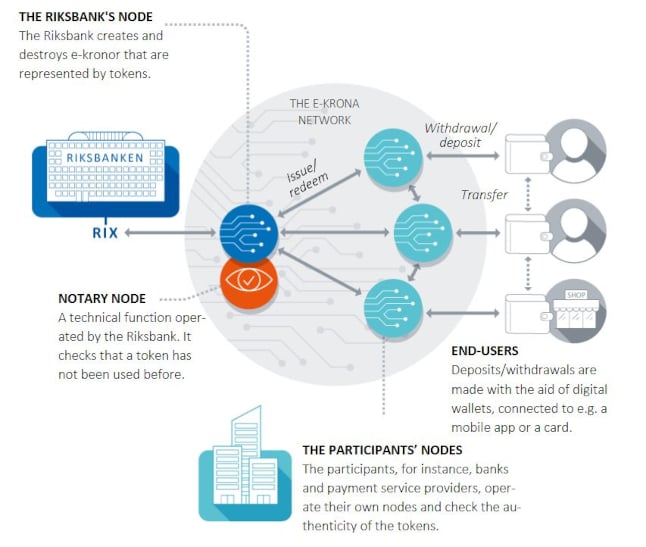What you need to know about Sweden's plans for a digital currency

Sweden has taken one step closer towards its own digital currency – the “e-krona”.
Plans to launch Sweden's own digital currency, which have been in the pipeline since 2016, recently passed the first pilot stage, the country's Central Bank (The Riksbank) announced in a press release.
So why is Sweden doing this?
Cash is dying a slow death in Sweden, with alternative methods of payment commonplace. The number of notes and coins in circulation has reduced by 40 percent since 2009, while popular smartphone apps like Swish allow electronic payments to be made almost as quickly as handing over physical money. Swedes are also among the world’s biggest card users.
“Sweden is noticeably further ahead than the UK, mainland Europe and the US, which is a long way behind in this trend. Because of how technologically developed it is, you see a lot of new interesting things in economics quite a while before you see it elsewhere,” HSBC global economist James Pomeroy told The Local back in 2018.
But what does a cashless society truly mean?
Sweden has previously been predicted to transform into a cashless society by 2030 with 80 percent of retail payments already made by card.
Concerns have been raised, including by the Riksbank, about how the cashless society affect certain groups, for example international residents who can't sign up for certain digital payment methods without a Swedish bank account or personnummer, and the elderly.
So although physical payments are declining, the Riksbank wants the e-krona to be seen as a complement to cash.
The piloted digital currency also has similarities to cash. E-kronor are uniquely identifiable and can only be created by the Riksbank, similar to actual physical money.
How exactly would an e-krona work?
The e-krona used in the Riksbank's pilot project uses blockchain technology and is in the shape of a singular "token". Transactions are completed through nodes which are run by the Riksbank and other participants such as payment service providers.
A service provider can request e-kronor that are issued from the Riksbank in exchange for the user debiting their account in the Riksbank’s settlement system RIX.
The customer can then exchange money in their bank accounts for e-kronor, that they can use for transactions instead.
When a person uses e-kronor for a transaction, the service providers’ nodes verify that the e-krona can be traced back to the Riksbank. The e-krona is then registered as consumed and the transaction is accepted.

An image provided by the Riksbank shows how the e-krona could work.
What happens now?
Following on from the pilot, the Riksbank said they will continue to work on a digital currency that will be usable in everyday life.
Phase 2 will include working with potential distributors, developing offline functions and assessing scalability for retail payments. This phase is expected to last at least a year.
How likely is a digital currency actually to happen?
There is still a long way to go before a digital currency is a reality. Several huge questions remain. For example, there is currently no legislation within this area, and new legislation would be needed. User identity protection is also an important question, as every e-krona contains information about previous transactions and recipients.
As of today, there have been no decisions on whether an e-krona should be issued and what that would look like. The Riksbank are clear that this is technology that needs further investigations and the pilot is not the final solution that has been chosen as the digital currency.
Comments (1)
See Also
Plans to launch Sweden's own digital currency, which have been in the pipeline since 2016, recently passed the first pilot stage, the country's Central Bank (The Riksbank) announced in a press release.
So why is Sweden doing this?
Cash is dying a slow death in Sweden, with alternative methods of payment commonplace. The number of notes and coins in circulation has reduced by 40 percent since 2009, while popular smartphone apps like Swish allow electronic payments to be made almost as quickly as handing over physical money. Swedes are also among the world’s biggest card users.
“Sweden is noticeably further ahead than the UK, mainland Europe and the US, which is a long way behind in this trend. Because of how technologically developed it is, you see a lot of new interesting things in economics quite a while before you see it elsewhere,” HSBC global economist James Pomeroy told The Local back in 2018.
But what does a cashless society truly mean?
Sweden has previously been predicted to transform into a cashless society by 2030 with 80 percent of retail payments already made by card.
Concerns have been raised, including by the Riksbank, about how the cashless society affect certain groups, for example international residents who can't sign up for certain digital payment methods without a Swedish bank account or personnummer, and the elderly.
So although physical payments are declining, the Riksbank wants the e-krona to be seen as a complement to cash.
The piloted digital currency also has similarities to cash. E-kronor are uniquely identifiable and can only be created by the Riksbank, similar to actual physical money.
How exactly would an e-krona work?
The e-krona used in the Riksbank's pilot project uses blockchain technology and is in the shape of a singular "token". Transactions are completed through nodes which are run by the Riksbank and other participants such as payment service providers.
A service provider can request e-kronor that are issued from the Riksbank in exchange for the user debiting their account in the Riksbank’s settlement system RIX.
The customer can then exchange money in their bank accounts for e-kronor, that they can use for transactions instead.
When a person uses e-kronor for a transaction, the service providers’ nodes verify that the e-krona can be traced back to the Riksbank. The e-krona is then registered as consumed and the transaction is accepted.

An image provided by the Riksbank shows how the e-krona could work.
What happens now?
Following on from the pilot, the Riksbank said they will continue to work on a digital currency that will be usable in everyday life.
Phase 2 will include working with potential distributors, developing offline functions and assessing scalability for retail payments. This phase is expected to last at least a year.
How likely is a digital currency actually to happen?
There is still a long way to go before a digital currency is a reality. Several huge questions remain. For example, there is currently no legislation within this area, and new legislation would be needed. User identity protection is also an important question, as every e-krona contains information about previous transactions and recipients.
As of today, there have been no decisions on whether an e-krona should be issued and what that would look like. The Riksbank are clear that this is technology that needs further investigations and the pilot is not the final solution that has been chosen as the digital currency.
Join the conversation in our comments section below. Share your own views and experience and if you have a question or suggestion for our journalists then email us at [email protected].
Please keep comments civil, constructive and on topic – and make sure to read our terms of use before getting involved.
Please log in here to leave a comment.